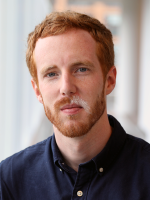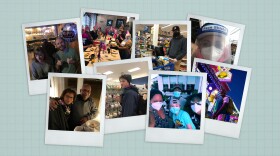
Nick Michael
Nick Michael is the Acting Supervising Editor for Video at NPR. He joined NPR in 2014 as the lead video producer for Jazz Night in America, NPR's first program with companion radio and video content. Jazz Night's 2017 portfolio earned a Peabody nomination and a Webby Award for Online Film & Video. Since then, he has co-managed the growth of NPR's award-winning video team, highlights of which include co-crafting the look of NPR's signature interviews with President Obama, leading NPR's experimentation with 360 video and audio and coordinating 22 filmmakers across the country to document 2017's solar eclipse. Before NPR, Michael co-founded 1504, a creative video studio now based in Birmingham, Ala. He earned a masters in photojournalism at the Missouri School of Journalism.
-
In the weeks leading up to the 20th anniversary of 9/11, NPR set up a phone booth in New York City and invited people to leave voicemails for someone they lost that day. Here's what they had to say.
-
As America continues to lead the world in per capita waste production, it's becoming more and more clear that everybody — from manufacturers to consumers — "over-believes" in recycling.
-
After nearly a year, it's easy to forget how suddenly the COVID-19 pandemic upended our lives. We want to see your photos.
-
Is it time to say R.I.P. to POC? And, if so, is BIPOC the new kid on the block? In this video, Code Switch co-host Shereen Marisol Meraji digs in.
-
What do you wish "the other side" understood about your life these last four years? Tell us, and we'll pass the message along.
-
If you're looking to boost your mask's ability to filter out small particles, we've got three tips from researchers who've been testing homemade mask materials in light of the pandemic.
-
Coronavirus got you nervous about grocery shopping? We talked to scientists for their advice about how to stay safe at the store — and when handling food back home.
-
Seven months after Hurricane Maria, thousands of people in the Puerto Rican mountains are still waiting for the lights to come back on. Why is power restoration for the last 2 percent so difficult?


